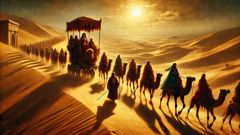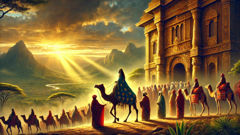Introduction
In the cradle of Africa, where the highlands are crowned with mist and rivers etch silver across green valleys, stories live in the roots of ancient sycamores and echo through stone churches carved into mountain rock. Among these stories, one towers above the rest—a legend carried in songs, whispered in prayer, and chronicled in the ancient book called the Kebra Nagast. It’s a tale that braids together wisdom, mystery, and the fate of a people, beginning with a queen who journeyed far beyond the horizon of her homeland. She was Makeda, Queen of Sheba, ruler of a land renowned for its gold and frankincense, its wisdom and its pride. Her kingdom stretched from the incense-laden mountains of southern Arabia to the fertile highlands of Ethiopia, a realm where traders brought stories from distant ports and priests guarded secrets older than time itself. But Makeda was not content with riches alone; she hungered for knowledge, for understanding beyond what her own priests and scholars could offer. Across the burning deserts and blue waters of the Red Sea, rumors reached her court of a king whose wisdom was as legendary as his wealth—Solomon, son of David, ruler of Israel. They said he could speak with animals, command spirits, and judge with a fairness that seemed otherworldly. The Queen’s curiosity became a fire. What secrets did this king possess? Was his wisdom truly divine, or merely the boasting of distant travelers? Determined to see for herself, Makeda summoned her council. Caravans were loaded with ivory, gold, and precious stones. Attendants in robes of deep indigo and red prepared gifts worthy of a king whose fame touched every corner of the world. As the Ethiopian sun rose behind her palace, Makeda set out, riding atop a litter draped in lion skins, leading a procession that shimmered like a river of light against the ancient earth. So began a journey that would span continents and change the course of history—a journey not just of diplomacy or trade, but of spirit and destiny. For in seeking Solomon’s wisdom, Makeda would find a truth that would shape her people for generations, and carry home with her the most precious relic ever to grace the mountains of Ethiopia.
Makeda’s Journey: Across Sands and Seas
Makeda’s departure from Sheba was a spectacle that etched itself into memory—her people lining the roads with songs and prayers, hoping their queen would return safely. Her retinue stretched for miles: noblemen on horseback, shield-bearers in bronze and leather, slaves leading camels burdened with gifts, and priests carrying scrolls wrapped in embroidered cloth. The journey to Jerusalem was neither swift nor easy. The caravan wound its way through burning deserts where the only sound was the sough of sand against stone, and through oases thick with date palms where water sparkled like molten silver. At night, they camped beneath a vault of stars, the queen often sitting apart by the fire, gazing at the heavens and pondering the riddles she would pose to Solomon.

Sheba’s priests and counselors, traveling at her side, carried their own doubts. What could a foreign king know that their own gods and sages did not? But Makeda was relentless in her pursuit. As weeks turned to months, the landscape changed. The air grew drier, the land flatter and more sun-baked. Yet the queen’s resolve was undimmed. Her curiosity became their compass.
The Red Sea crossing was an ordeal of its own. The flotilla of ships, sails billowing like desert kites, ferried her court across waters haunted by pirates and tempestuous winds. But Makeda was protected by her faith and by the blessings of her ancestors—so her people believed. After many trials, her caravan finally arrived at the gates of Jerusalem.
The city was unlike anything Makeda had ever seen—its limestone walls glowed in the afternoon sun, and the great Temple rose above all, crowned with golden spires. The Queen’s arrival was met with awe and a respectful hush. Her gifts dazzled Solomon’s court: bars of gold heavy enough to bow the backs of strong men, rare gems that glinted with inner fire, and aromatic spices that perfumed the air for days. But Makeda’s most valuable gift was her presence—her keen mind, her wisdom, and her riddles.
Solomon received her in the cedar-paneled hall of his palace, surrounded by scribes, advisers, and musicians. He was younger than she had imagined, but there was gravity in his eyes, a calm that seemed to draw the very light toward him. The two monarchs spoke in metaphors and riddles, each testing the other’s wit. Makeda challenged Solomon with questions that puzzled even his wisest men: “What is the well without water?” “What is the garment that grows with its wearer?” Solomon answered each in turn, never once faltering, his answers clear as sunrise. Yet he listened as much as he spoke, drawn by Makeda’s sharp intellect and regal bearing. For days, debates filled the palace halls, and in the quiet of the evenings, they spoke privately, sharing philosophies and dreams for their peoples.
The courtiers whispered of a growing bond between the two rulers—a kinship beyond politics or commerce. There was respect, but also a spark of something deeper, a recognition of equals across chasms of culture and distance. For Makeda, Solomon became more than a riddle to be solved; for Solomon, Makeda was a mirror to his own longing for understanding.
Solomon’s Wisdom and a Night of Destiny
Days turned into weeks, and Jerusalem’s air hummed with the excitement of Makeda’s presence. Her riddles became legend; even the city’s children repeated them in marketplaces, testing one another’s wits in imitation of their rulers. Solomon, for his part, revealed the full breadth of his wisdom. He spoke of justice and mercy, of the nature of power and the frailty of human ambition. He led Makeda through the great Temple, showing her the sacred vessels and the Ark of the Covenant itself—enshrined behind a veil of gold and incense smoke. To Makeda, this was more than treasure; it was a living symbol of faith, a mystery bound in wood and gold.

One evening, as the city cooled beneath a velvet sky, Solomon prepared a banquet for Makeda. The tables were laden with roasted lamb and honey cakes, goblets brimming with spiced wine. Musicians played harps and lyres while dancers spun in silks. But for all the grandeur, Solomon reserved his most precious gift for the end: a private conversation, away from the crowds.
Makeda confessed her awe at what she had seen—not just the wealth or splendor, but the way Solomon ruled, with humility and purpose. She asked him, “Is wisdom a gift from the gods or a burden to be carried?” Solomon smiled, replying, “It is both. To know much is to serve much, to carry the questions of your people as well as their hopes.”
That night, after the palace had grown quiet and the lamps burned low, fate intervened. According to legend, Solomon offered Makeda a guest chamber and insisted that she accept nothing from his house unless he gave it. In turn, Makeda asked that he not take anything from her against her will. Solomon agreed, and they sealed their bargain.
But before sleep, Solomon instructed his servants to set out a feast heavy with spices, and pitchers of water beside Makeda’s bed. In the midnight silence, thirst overcame her, and she drank. At that moment, Solomon appeared, claiming that by taking water she had broken her word. The terms reversed, Makeda allowed Solomon to approach her as an equal—thus began a night that would be remembered for centuries, a night that united wisdom and curiosity, power and longing.
By morning, nothing in Jerusalem seemed quite the same. A bond had been forged not merely of desire but of destiny—one that would ripple across nations and ages. When Makeda departed, she did so with Solomon’s blessing and a heart changed by all she had learned. And, as Ethiopian tradition tells, she carried within her more than wisdom: she bore a child, one who would become a king in his own right.
The Return: Ethiopia’s Destiny and the Ark’s Secret
The journey home was bittersweet for Makeda. The streets of Jerusalem faded behind her, replaced by the long road back through arid lands and storm-tossed seas. Yet she did not return alone; within her grew a life destined to shape the future of her people. The queen traveled in contemplation, her mind turning over the mysteries she had seen and the lessons she had learned. Her counselors pressed her for details—what had she found in Solomon’s wisdom that could not be gleaned from their own prophets? Makeda answered with humility: “True wisdom does not diminish when shared. It grows.”

The return to Ethiopia was met with joy and relief. Her people gathered in throngs, bearing garlands of flowers and singing songs in celebration. Yet Makeda was changed—her gaze deeper, her voice steadier. She called her people to assemble in the great square before her palace, where she shared stories of her journey, not as a conquest but as a pilgrimage of the spirit. She spoke of justice as Solomon had taught her: that a ruler must serve as much as command, must listen as much as decree.
In time, Makeda gave birth to a son whom she named Menelik. He grew strong and wise under her guidance, inheriting his mother’s dignity and his father’s sharp mind. As Menelik came of age, Makeda revealed to him the truth of his parentage and the expectations resting on his shoulders. She sent him to Jerusalem to meet his father, not as a supplicant but as an equal. Solomon received Menelik with open arms, bestowing upon him blessings and symbols of kingship. Yet Menelik’s heart belonged to Ethiopia; he returned home, carrying with him companions who would become the founders of noble families.
But the greatest treasure he brought was shrouded in secrecy—the Ark of the Covenant itself. According to legend, it was spirited away from Solomon’s Temple by Menelik and his retinue, guided by a vision and the hand of fate. Some say it was God’s will that the Ark find sanctuary in Ethiopia; others whisper it was Makeda’s legacy that drew it there. Hidden in the sacred city of Axum, the Ark became the spiritual heart of Ethiopia. Priests guarded it in silence, and generations of emperors traced their lineage to Makeda and Solomon, claiming a divine right to rule.
Makeda ruled long and wisely, her reign marked by prosperity and justice. Her legend grew with every passing year, woven into songs and prayers, etched into chronicles and recited at festivals. When she died, her people mourned not just a queen but a mother who had given them identity, faith, and a destiny entwined with the mysteries of the Ark. The story of Makeda, Solomon, and the Ark became the foundation of Ethiopia’s national epic—the Kebra Nagast—a living testament to the power of seeking wisdom beyond one’s borders and the enduring bond between two ancient lands.
Conclusion
To this day, the legend of the Queen of Sheba endures in Ethiopia’s songs, in the solemn rituals at Axum, and in the hearts of all who cherish wisdom and heritage. The story is more than myth—it’s a reminder that the pursuit of understanding bridges worlds, and that faith is both a journey and a homecoming. For Ethiopians, Makeda’s legacy is seen in the proud faces of children who hear her name sung at church or whispered by elders at dusk. The Ark’s secret presence is felt in every stone church and in the prayers that rise with incense smoke toward the morning sun. And for those beyond Ethiopia’s mountains, the tale offers a window into an Africa ancient and proud, where queens ride out seeking truth and kings measure greatness not by conquest but by their capacity to listen and learn. The Kebra Nagast endures not just as a book but as a living testament—one that invites each generation to seek wisdom, honor their roots, and believe that destiny can be shaped by courage and curiosity. In Makeda’s footsteps lies a path open to all who would walk it, wherever they may call home.













